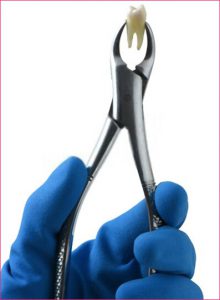Tooth Extractions
Tooth extractions involve removing the tooth from its socket in the bone. Often, a damaged tooth may be saved through fillings, crowns or other restorative methods. If the damage is too severe, your dentist will resort to extracting the tooth.
Other reasons for tooth extraction include:
- removing baby teeth to allow for the growth of permanent teeth
- to create room for the alignment of teeth when using braces
- extracting wisdom teeth before or after they erupt from the gum line
- cases where the patient might have extra teeth, blocking other teeth from growing
- removing teeth that may be infected after an organ transplant or cancer treatment
- when a patient is under radiation therapy, and the tooth is within the field of radiation

Types of tooth extractions
There are two types of tooth extractions:
- Simple extraction
- Surgical extraction
Simple tooth extractions
A simple extraction is performed on a tooth that is visible within the mouth. It is a fairly common procedure. The dentist first loosens the tooth using a surgical tool called an elevator. They then use forceps to remove the tooth.
Surgical extraction
Surgical tooth extractions are more complex. Your dentist will perform this type of extraction when the tooth:
- has broken off in the gum line
- or, has not yet erupted from the gum line
After administering an anesthesia, the doctor will make a small incision into your gum. They might also remove any tissue or bone covering the tooth before they extract it.
After the tooth extraction
It is normal to feel some mild discomfort after the procedure. Your dentist might prescribe some pain medication to ease your discomfort. They, ideally, will also give you instructions to follow for full recovery. Surgical extractions may cause more pain than the simple extractions. The recovery period depends on the complexity of the extraction.
After the procedure, you should follow the following tips:
Place gauze or cotton wool over the bleeding area for 20 – 30 minutes to allow the blood to clot
Avoid hot foods for a few days. It is advisable to eat soft and cold food until you are comfortable with your old diet
Rinsing your mouth with warm, salty water would help in keeping the area clean
Avoid smoking or using a straw after the procedure. The sucking motion may dislodge the clot and cause bleeding. Smoking might also contaminate the wound.
Call your dentist if:
- You experience difficulties while swallowing
- You are experience uncontrolled bleeding
- You continue to feel numb in your tongue, chin or lip 3 -4 hours after the procedure
- The area where the extraction took place is very painful
- You are experiencing fever or chills
- The swelling is worsening instead of going down
- The affected area continues to bleed 24 hours after the procedure

